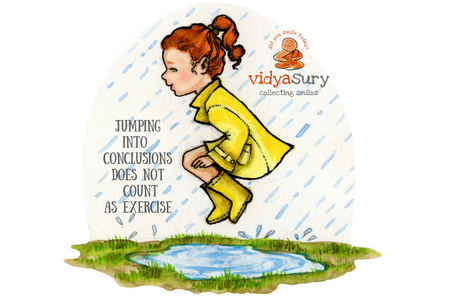 Her mum came in and softly asked her little daughter with a smile: my sweetie, could you give your mum one of your two apples? The girl looked up at her mum for a few seconds, then she took a quick bite on one apple, and then on the other. The mum felt the smile on her face freeze. She tried hard not to reveal her disappointment. Then the little girl handed one of her bitten apples to her mum, and said: Mummy, here you are. This is the sweeter one.
Her mum came in and softly asked her little daughter with a smile: my sweetie, could you give your mum one of your two apples? The girl looked up at her mum for a few seconds, then she took a quick bite on one apple, and then on the other. The mum felt the smile on her face freeze. She tried hard not to reveal her disappointment. Then the little girl handed one of her bitten apples to her mum, and said: Mummy, here you are. This is the sweeter one. ♥
Can you imagine how that Mom must have felt?
I know!
The Wikipedia describes jumping to conclusions as follows:
Jumping to conclusions(officially the jumpingconclusionbias, often abbreviated as JTC, and also referred to as the inference-observation confusion) is a psychological term referring to a communication obstacle where one "judge[s] or decide[s] something without having all the facts; to reach unwarranted conclusions".
We grow up learning that it is good to reserve judgment and not jump to conclusions. However, no one can be purely non-judgmental, simply because on a primitive level, it is our brain's duty to add judgment to everything we see.
I am sure you experience it all the time. I do!
I remember, as a child, when I watched a movie and saw the actor playing the villain, I assumed he was a real-life villain too and would secretly feel afraid of bumping into him. It is only later I learned they were playing roles and were nice people in real life. Most of them anyway!
Then there's the reverse jumping to conclusions-people who appear wonderful initially and later, show their true colors. It takes all sorts, eh?
We are all so adept at judging people by their appearances, even though we know better. We are even justified in the way we think, sometimes.
My uncle enjoyed repeating the phrase "give them the benefit of the doubt" and I've realized the sense behind this only as I grew older. Life's experiences are better lessons than receiving advice. When we're younger, this advice is invariably met with an eye roll.
Judging is our own assessment of what we see, rather than describing what we see. And so, the problem with judging is, it intensifies our emotional mind. The emotion following a negative judgment, is also usually negative. Sort of an unpleasant taste!
Can you overcome this?You don't want to be this person whose only exercise is jumping to conclusions, running down their friends, side-stepping responsibility, and pushing their luck!
How to become less judgmental?Being non-judgmental is directly connected to living mindfully. Mindful living is a state of active, open attention to the present. When we're mindful, we see our thoughts and feelings from the outside, without judging them and labeling them good or bad.
So, initially it can feel weird to practice being non-judgmental, especially when you're stuck in an emotional conflict, but it gets easier. Being judgmental impacts our lives, and limits our relationships with others. It literally forms a wall that keeps the joy out.
Here's something my Mom used to suggest. Of course, at the time, I'd half-heartedly try it just because she was saying it, without actually believing it. But now, I see the logic and also see it working. Hindsight is 20/20 eh?
Try it - it is an interesting exercise:- Think of judgment as a heavy pair of glasses with smudged lenses that distort your view of people and situations, and imagine taking them off.
- Now blink. Take a step back and look at yourself and the world, mindfully, without being weighed down by the heavy lenses of judgment. Let go of any negative thoughts, as you appreciate the present moment. Feel the warmth and compassion as you reflect on your experiences, your dreams, regrets, doubts, fears...
- Allow the barrier of judgment between you and others, and the barrier that separates your authentic self from your judgmental self to melt away.
- Ask yourself what you really want in life. It could be love, the desire to belong, and perhaps a sense of acceptance within yourself. Whatever it is, accept your needs mindfully.
Being mindful helps you release judgment, and thereby, suffering.
And by the way, releasing judgment doesn't imply that you approve of things that are against your values. It means you are allowing yourself to shift to a place of emotional peace and acceptance of what is. It also enables you release fear and anxiety. In the process, you also learn what is truly in your control. And it feels good.
Begin small. Try being mindful and non-judgmental toward a situation today. One way to do it is to imagine the situation as though it were happening on TV-see what's happening from the outside.
Not easy at first-so take it slowly. Break the pattern. Each time you catch yourself judging, convert it into a describing statement.
In fact, how about this: Put a coin in a jar each time you find yourself judging yourself, or others. Then donate the money to a worthy cause.
No matter who you are, how experienced you are, and how much you think you know, go easy on the judgment. Give others the privilege to explain themselves. What you see may not be the reality. Never conclude for others.
"Kind thoughts are rarer than either kind words or deeds. They imply a great deal of thinking about others. This in itself is rare. But they also imply a great deal of thinking about others without the thoughts being criticisms. This is rarer still." - Frederick W. FaberThe image of the girl jumping to conclusions at the top of the post is from Shutterstock What are your thoughts about jumping to conclusions?

Writer, editor, blogger, social media enthusiast. Love DIY, Coffee, Music, Reading, Photography, Family, Friends and Life. Mantra: Happiness is a DIY Project. In my free time I play with my dust bunnies and show my diabetes who's boss. Tweet as @vidyasury

